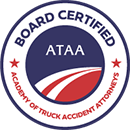What Is the Difference Between Interstate and Intrastate Trucking?
Most of us readily recognize the term “interstate” as describing a fast-speed roadway that is free of traffic signals and riddled with exits for different stops along the way that connects one state to another. However, according to the title of this piece, you saw where the term interstate is used to describe a type of trucking in contrast with “intrastate” trucking.
Interstate trucking describes any crossing of state or international borders. In contrast, intrastate trucking refers to a trucker who keeps within a specific state’s borders, which is usually in the same one where a carrier has its hub. There are some exceptions to this rule per the Federal Motor Carrier Safety Administration (FMCSA), though. In the grand scheme of things, where the load originated and ends up makes a difference as to whether the trip is classified as intrastate or interstate.
Why does it matter if an operator’s trip is interstate or intrastate trucking? It matters to you as a passenger car driver if you get hurt in a crash. Read on to learn why that’s the case.
Interstate vs. Intrastate Truckers Are Subject to Different Rules
Generally, any motorist, trucker or not, must adhere to respective states’ laws when traveling on their roadways. However, the importance of knowing whether a trucking operation is known as an interstate or intrastate one is that it affects whether state or federal laws or regulations apply to them. Long story short, those parties engaged in interstate trucking must abide by Federal Motor Carrier Safety Regulations (FMCSR) established by FMCSA as well as laws set forth by the states in which they are operating and traveling through, and those wholly engaged in intrastate trucking must abide by the regulations imposed by the corresponding state agency. Depending on the truck or situation, some FMCSA regulations may also apply to intrastate trucking.
These interstate or intrastate regulations generally apply to commercial carriers, including some of the following:
- Tanker trucks
- Refrigerator trucks
- Dump trucks
- 18-wheelers
- Garbage trucks
- Flat-bed trucks
- Cement mixers
- Many other types of trucks
Differences Between Intrastate and Interstate Trucking Regulations
Here at Trucking Injury Law Group, our Super Team of lawyers handles tractor-trailer crashes across the United States, which gives us a front-row seat to how each state’s trucking regulations are quite different from one another and how they also deviate from federal rules. Some examples of how interstate and intrastate regulations differ include:
Department of Transportation (DOT) Number Requirements
In some jurisdictions, like Idaho, for example, it’s necessary for truckers planning to operate both inside and outside the state to obtain a federally-issued DOT number for their truck since they’d be classified as interstate carriers. All others, which would presumably be local or short-haul carriers, would only have to secure a state DOT number per the Idaho State Police (ISP).
Weight Requirements That Truckers Can Carry May Vary
A truck’s classification as interstate or intrastate may affect how much a truck can carry. According to the Federal Highway Administration (FHWA), federal law limits states from enforcing weight limits on interstates that are markedly different from federal limits; however, at the same time, this FHWA report outlines various circumstances under which states are exempt from standard federal limits as it relates to the following vehicles:
- Tow trucks
- Emission reduction equipment
- Log trucks
- Snowplows
- Agricultural equipment
- Garbage trucks
- Construction equipment
- Fire trucks
- Government-owned vehicles
- Trucks hauling aggregates like gravel, rock, or sand
- Highway road work equipment
As you’ll note in the above-referenced federal government resource, not only does the truck’s use make a difference as to whether it’s subject to federal or state standards (or interstate or intrastate ones), but it affects the weight a vehicle can be when riding down certain roadways depending on its axle configuration.
Insurance Requirements for Intrastate and Interstate Carriers Differ
Carriers subject to FMCSA requirements generally must carry $750,000 or more in liability coverage; however, in a state like Texas, for example, their state insurance laws only require truckers to carry a $300,000 limit.
On- and Off-Duty Trucker Requirements
FMCSR limits truckers from spending more than 14 hours on duty and more than 11 hours actually driving. These federal regulations also require truckers to spend ten consecutive hours resting before returning to duty and limit truckers from spending more than 60 hours across seven days or 70 across eight days operating their trucks, and require operators to be off at least a straight 34 hours before returning to driving a big rig. State regulations that apply to intrastate tractor-trailer operations may be more or less than what federal regulations allow.
Age Requirements for Truckers
Federal regulations require anyone engaged in interstate trucking to be 21 or older. Many states allow those engaged in intrastate trucking to do so at age 18.
Why Intrastate or Interstate Trucking Classifications Matter
If you’ve been involved in a crash with a tractor-trailer or some other commercial carrier, then the trucking regulations that applied to that operator could significantly affect your ability to prove liability and how much you’re able to recover as compensation if you’ve suffered catastrophic injuries in a rear-end trucking accident or experienced the loss of a loved one in a head-on one, for example.
How To Determine if You’ve Been Struck by an Interstate or Intrastate Trucker
Some trucks are more commonly used for interstate versus intrastate commerce. Examples of trucks used intrastate include ones like:
- Concrete or cement mixers
- Open bed street cleaning trucks
- Tow trucks
- Bucket trucks (the ones tree companies or power companies use to get to high-to-reach places)
- Garbage trucks
- Box trucks (like moving trucks)
Trucks often used for interstate purposes include:
- Tanker trucks
- Flat-bed trucks
- 18-wheelers
Of course, there can be some overlap here.
One of perhaps the easiest ways to determine if the trucker who struck you was involved in intrastate or interstate trucking and thus subject to state or federal regulations is to review the accident report for the DOT registration number.
Looking up these numbers can be a bit tricky if you don’t know where to look, which is why truck accident victims like you will often reach out to an attorney like ours for assistance in tracking down this information. They also do so to assist with liability determinations in their cases, as this, the extent of their injuries, and a number of other factors affect their ability to secure a settlement in their case.
Our legal team is available for free case consults to review your claim and the specific interstate or intrastate trucking regulations that may apply to it, statutes of limitations that apply, and other details that may affect your ability to bring a claim. Contact us to schedule your initial meeting with one of our Boise truck accident lawyers at Trucking Injury Law Group. You’ll find our breadth of experience valuable when it comes to going up against big trucking companies and their insurers.






